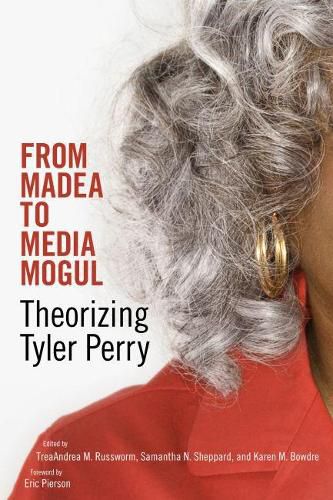Readings Newsletter
Become a Readings Member to make your shopping experience even easier.
Sign in or sign up for free!
You’re not far away from qualifying for FREE standard shipping within Australia
You’ve qualified for FREE standard shipping within Australia
The cart is loading…






This title is printed to order. This book may have been self-published. If so, we cannot guarantee the quality of the content. In the main most books will have gone through the editing process however some may not. We therefore suggest that you be aware of this before ordering this book. If in doubt check either the author or publisher’s details as we are unable to accept any returns unless they are faulty. Please contact us if you have any questions.
For over a decade, Tyler Perry has been a lightning rod for both criticism and praise. To some he is most widely known for his drag performances as Madea, a self-proclaimed
mad black woman,
not afraid to brandish a gun or a scalding pot of grits. But to others who watch the film industry, he is the businessman who by age thirty-six had sold more than $100 million in tickets, $30 million in videos, $20 million in merchandise, and was producing 300 projects each year viewed by 35,000 every week.
Is the commercially successful African American actor, director, screenwriter, playwright, and producer
malt liquor for the masses,
an
embarrassment to the race!,
or is he a genius who has directed the most culturally significant American melodramas since Douglas Sirk? Are his films and television shows even melodramas, or are they conservative Christian diatribes, cheeky camp, or social satires? Do Perry’s flattened narratives and character tropes irresponsibly collapse important social discourses into one-dimensional tales that affirm the notion of a
post-racial
society?In light of these debates, From Madea to Media Mogul makes the argument that Tyler Perry must be understood as a figure at the nexus of converging factors, cultural events, and historical traditions. Contributors demonstrate how a critical engagement with Perry’s work and media practices highlights a need for studies to grapple with developing theories and methods on disreputable media. These essays challenge value-judgment criticisms and offer new insights on the industrial and formal qualities of Perry’s work.
$9.00 standard shipping within Australia
FREE standard shipping within Australia for orders over $100.00
Express & International shipping calculated at checkout
This title is printed to order. This book may have been self-published. If so, we cannot guarantee the quality of the content. In the main most books will have gone through the editing process however some may not. We therefore suggest that you be aware of this before ordering this book. If in doubt check either the author or publisher’s details as we are unable to accept any returns unless they are faulty. Please contact us if you have any questions.
For over a decade, Tyler Perry has been a lightning rod for both criticism and praise. To some he is most widely known for his drag performances as Madea, a self-proclaimed
mad black woman,
not afraid to brandish a gun or a scalding pot of grits. But to others who watch the film industry, he is the businessman who by age thirty-six had sold more than $100 million in tickets, $30 million in videos, $20 million in merchandise, and was producing 300 projects each year viewed by 35,000 every week.
Is the commercially successful African American actor, director, screenwriter, playwright, and producer
malt liquor for the masses,
an
embarrassment to the race!,
or is he a genius who has directed the most culturally significant American melodramas since Douglas Sirk? Are his films and television shows even melodramas, or are they conservative Christian diatribes, cheeky camp, or social satires? Do Perry’s flattened narratives and character tropes irresponsibly collapse important social discourses into one-dimensional tales that affirm the notion of a
post-racial
society?In light of these debates, From Madea to Media Mogul makes the argument that Tyler Perry must be understood as a figure at the nexus of converging factors, cultural events, and historical traditions. Contributors demonstrate how a critical engagement with Perry’s work and media practices highlights a need for studies to grapple with developing theories and methods on disreputable media. These essays challenge value-judgment criticisms and offer new insights on the industrial and formal qualities of Perry’s work.